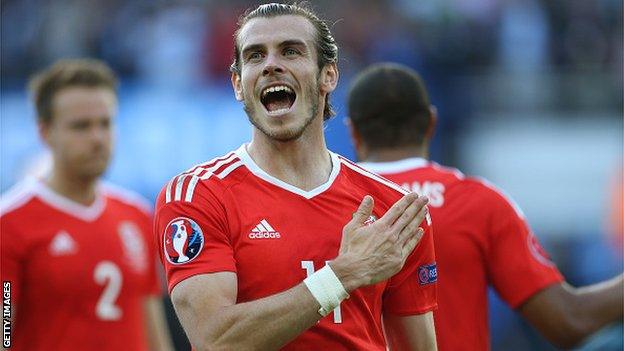What Scotland can learn from performances at Euro 2016
- Published

Gareth Bale has inspired Wales to make the quarter-finals of Euro 2016.
The first knockout round of Euro 2016 brought urgency and tension to the tournament. Some reputations were enhanced, while others were critically undermined, but there is also an opportunity to reflect.
Introspection belongs to the defeated nations now, since Scotland has already endured a spell of self-analysis. Even so, there are lessons to be learned from the way countries have succeeded and failed in France.
Teamwork trumps individuals
Gordon Strachan has lamented the absence of a world-class performer in his Scotland squad. Euro 2016 has offered a clear reminder that ability alone is not always the deciding factor in games.
Some teams have succeeded despite fielding comparatively inferior players to their opponents, most vividly the way that Iceland out-worked and out-foxed England.
Unity, the sharing of a common purpose, is a strong tool to enhance motivation and performance, but so too is effective blending of individual strengths and covering for weaknesses. Iceland's displays have been based on organisation, on each unit of the team being well-drilled and industrious.
Hearts head coach Robbie Neilson |
|---|
"You see Iceland progressing to the quarter finals. It just goes to show that hard work and commitment can overcome a lot. I watched [Lars Lagerback] at the Pro licence and he gets great team spirit. He gets [Iceland] working hard, playing together. For a small nation, it's great and I hope we do something like that. |
The Republic of Ireland built on those qualities and added an element of attacking intent as they overcame Italy in the group stages. Martin O'Neill's team is composed of his own characteristics: flinty, bullish, irrepressible.
The most effective example has been an Italian side that most of their native observers described ahead of the tournament as the worst the nation had sent to the finals of an international competition.
Yet their collective poise, compactness as a defensive unit and tactical accomplishment has been exemplary. The coaching work of the coach, Antonio Conte, is evident, and aided by the fact that the back three and goalkeeper have all played together at Juventus for several years.
In contrast, the Sweden of Zlatan Ibrahimovic, to an extent the Portugal of Cristiano Ronaldo, and even for many of the games so far, the Belgium of Eden Hazard and Kevin de Bruyne, have not been as effective or impressive. Poland have progressed in spite of Robert Lewandowski's poor form.
In that regard, Scotland need not be hampered by the level the players are at. The challenge is to find the means to maximise their performance as a group.
It's not about possession but how you use the ball
Spain delivered a generation of players capable of winning all the major honours based on their ability to pass the ball quickly and accurately while pressing high up the pitch. They hoard possession and they have the technicians and players of artistry able to convert that possession into chances, even in crowded situations.
The style suits the characteristics of their players, but it doesn't apply universally. England subdued some of the best of their traits - hard running, dynamism, directness - to pursue a Spanish-style approach and ended up forlorn. Other countries have thrived by spending less time in possession of the ball but using it more effectively.
Italy, again, set the standard with their quick, incisive counter-attacks, deservedly overcoming Belgium and Spain - teams that were considered beforehand to be better and stronger.
Hibernian manager Neil Lennon |
|---|
"Italy v Spain was an absolute classic. I thought the Italians were absolutely superb. Tactically and technically. I thought Italy thoroughly deserved their win." |
Conte's team have performed with a tactical sophistication that only Germany have matched. Iceland, Northern Ireland, Hungary and, to an extent, the Republic of Ireland reached the knockout stages with an approach based on solid defence, conservatism and resourceful attacking. Football played with the mind will generally be more effective than football played primarily on emotion.
Deep back lines, with compact midfields that work in tandem across the pitch as well as vertically, are becoming more prominent. Some of the best play has come by defenders in and around their own boxes - blocking shots, covering runs, tackling effectively. While some of the most significant mistakes have come when weaker-willed defenders have lost concentration in the final third.
Strachan has stressed that he wants his players to pass the ball better, but with the quality he has to call upon, the focus ought to be on a compact, rigid shape and breaking effectively and decisively, a set-up that primarily makes Scotland difficult to beat.
Strike partnerships work
The predominant formations still tend to involve packing the midfield and playing a lone striker, but frontline partnerships are no longer seen as redundant.
Several of the nations that reached the knockout stages played at least some of their games with two up front, including the Republic of Ireland, with Shane Long and Darryl Murphy working in tandem with each other.

Gordon Strachan believes Scotland are better than several of the teams on show at Euro 2016
Italy, with Graziano Pelle and Eder, Iceland with Kolbeinn Sigthorsson and Jon Dadi Bodvarsson, and Poland with Lewandowski and Arkadiusz Milik, have all benefited from strike partnerships. They have to work within the balance of the team, although only Italy have used them in a 3-5-2 shape, but centre-backs used to facing a lone striker and attacking midfielders have had to adapt to a different challenge.
Strachan has tended to rely on playing Steven Fletcher alone up front and deploying a bank of attacking midfielders behind him. Yet the improving form of other strikers like Ross McCormack, Leigh Griffiths and even the arch poacher, Jordan Rhodes, could be facilitated in a different formation without leaving Scotland open.
Scotland weren't missed
The Tartan Army would have added colour and vibrancy to the occasion, but plenty of other fans have made a party of their visit to France.
The Northern Irish, Welsh and Irish fans have been conspicuous, while the co-ordinated chanting and clapping of the Iceland fans has been striking.
It is Scotland who have missed their involvement, not Euro 2016.